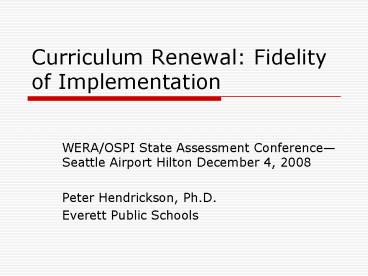Curriculum Renewal: Fidelity of Implementation PowerPoint PPT Presentation
1 / 17
Title: Curriculum Renewal: Fidelity of Implementation
1
Curriculum Renewal Fidelity of Implementation
- WERA/OSPI State Assessment ConferenceSeattle
Airport Hilton December 4, 2008 - Peter Hendrickson, Ph.D.
- Everett Public Schools
2
Program Evaluation
- Fidelity of Implementation
- Program Model
- Theory of Action or Logic Model
- To what extent, consistent?
- Program Impacts
- Knowledge
- Skills
- Dispositions
3
Theory of Action
- What are you doing?
- Who are you doing it with?
- What resources do you have?
- What effects do you expect?
- (Green, 2008)
4
Logic Model fragment
5
FOI Critical Components
- Structural/ procedural
- Structural/ educative
- Instructional/ pedagogical
- Student engagement
- What to do
- Need to know
- Instructional strategies
- Expectations for students
- (Century et.al., 2007)
6
Degree implemented
- On Model, Off Model
- Various Models, e.g.
- Read 180 90 minute
- Local 55 minute HS
- Local 45 minute MS
- Local 45 minute, plus 30 SSR
7
Direct Observation--Tools
- Observation protocol
- Train observers
- Timely feedback
- Additional information
- Use the data
8
FOI Framework, p.1
9
FOI Framework, p. 2
10
Zoomerang survey
- Objectives
- Design
- Format, pilot
- Administer, remind
- Organize data
- Analyze
- Report
11
Focus groups
- Representative
- Possible time
- Field test
- Conduct
- Transcribe, validate
- Content analysis
12
Interviews
- Go to their turf
- Probe for key elements
- Keep short
- Listen for unexpected
- Dont argue
- Act on findings
13
Software monitoring
- Who enrolled
- Time on software
- Books read
- Vocabulary growth
- Comprehension growth
- Coasting?
14
Student Information System
- Present
- Tardy
- Gender
- Ethnicity
- Prior learning
- Special programs
15
References
- Bamberger, M., J. Rugh, L. Mabry. (2006). Real
World Evaluation. Thousand Oaks, CA Sage
Publications. Three veteran program evaluators
reveal tricks of the trade with limited
resources, time or commitment. - Borman, G., Slavin, R.E., Cheung, A.,
Chamberlain, A., Madden, N.A., Chambers, B.
(2007). Final reading outcomes of the national
randomized field trial of Success for All.
American Educational Research Journal, 44 (3),
701-731. When implementing Success for All,
considerable emphasis is placed on fidelity.
External evaluators, extensive training for
building principals, building-wide commitment and
exhaustive instructional rubrics set the program
apart from most other literacy models. - CEMSE. (2007). Fidelity of Implementation
Questionnaires for Mathematics Curriculum in
Grades 1-5. , Chicago, IL University of
Chicago. - CEMSE. (2008). Critical Components Definitions
and Explanations. Retrieved November 21, 2008
from the Worldwide Web at http//cemse.uchicago.ed
u/files/CCDefinitions summary 2008_11_110.pdf
This fully fleshed math and science FOI checklist
provides a useful base document for creating
local checklists.
16
References
- Century, J., Freeman, C., Rudnick, M., Leslie,
D. (2007). A conceptual framework for fidelity of
implementation of instructional materials. Paper
presented at the Annual Meeting of the American
Educational Research Association, New York, NY.
March 28th 2008. - Fullan, M. (2001). Leading in a Culture of
Change. San Francisco, CA Jossey-Bass. - Hendrickson, P. (2008). Unpublished principal
interview protocols for several program
evaluations. Everett, WA Everett Public
Schools. - --. (2006). Read 180 Placement, Assessment and
Reporting Guide. NYC, NY Scholastic. The PARG is
a companion tool to the Research Protocol and
Tools (2007). - Kerman, Sam. (1979). Teacher Expectations and
Student Achievement. Phi Delta Kappan, v.60,
n.10, p. 716-18, June 1979. - National Sciences Resource Center. (1977).
Science for All Children. Washington, D.C.
National Academy Press. - Zoomerang is available free via www.zoomerang.com
on the Worldwide Web to implement surveys for
limited use. A full license is less than 500
per year. Survey Monkey works, too.
17
Contact Information
- Peter Hendrickson, Ph.D.
- Curriculum Specialist
- Assessment, Research, Program Evaluation
- Everett Public Schools
- Tel 425.385.4057
- E phendrickson_at_everettsd.org

